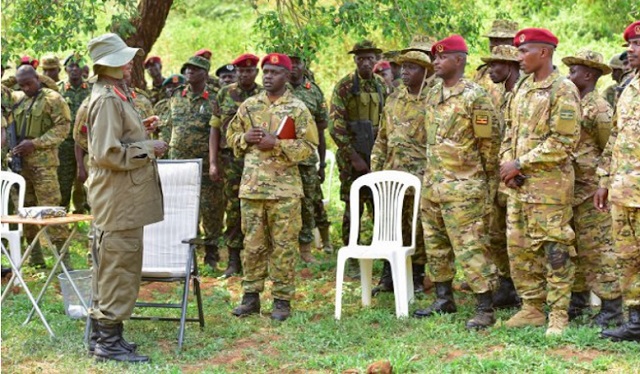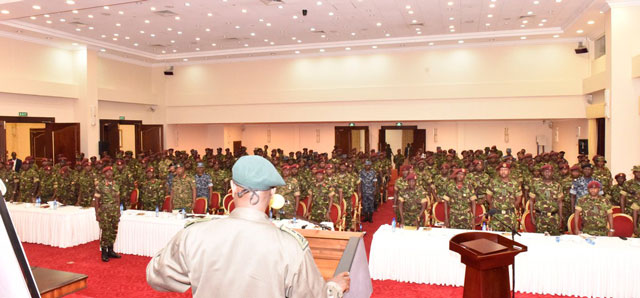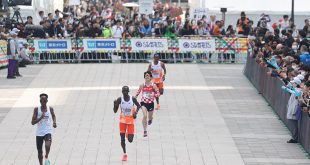
Analysts on how the former guerilla leader practices self-preservation after 35 years in power
Kampala, Uganda | IAN KATUSIIME | News this week of a coup in Guinea surprised many people not least its victim President Alpha Conde whose photos of him looking disheveled in a half buttoned shirt seated on a sofa surrounded by his AK47 wielding captors left many people pondering on what it actually means to “hold power” in African countries.
Conde’s story is not so different from the usual African strongman. He pushed ahead with a controversial third term last year in which Guineans were killed while protesting the maneuver. Conde did not have a military background but it was the usual playbook; consolidating power, muzzling the press, jailing opponents.
In the last few years, military coup d’états have been occurring with surprising frequency on the African continent. Mali, Central African Republic, Niger and Zimbabwe.
Naturally the talk of whether a similar event can happen in Uganda gets underway whenever there are mutinous developments in other African countries.
In the Museveni era, Uganda has had its own coup whispers and it was hard to tell whether they were real or decoy actions. In March 2013, gunmen attacked Mbuya barracks at the army headquarters which sparked rumours of a suspected coup although they died out soon after.
In June 2016, there were clashes involving SFC, UPDF officers and police and other gunmen in different pockets of the country. Scores were arrested but they all looked like false flag operations. Those who carried out the arrests said the suspects were involved in subversive activities. That was the end of it.
Supporters of President Museveni who is in his 35th year in power says a military coup cannot happen because he wields unquestionable authority on the army; the Uganda Peoples Defence Forces (UPDF).
His regular reshuffles of the UPDF top brass create an aura of invincibility of around him. But Museveni’s age and the ever bubbling political tensions in the country appear to create vulnerabilities around the power structures he has presided over for years.
We are unlikely to see what happened in Guinea here, says Ibrahim Semujju, MP for Kira Municipality, and a renowned commentator on military matters. He argues that Uganda is in a “unique” situation. “Museveni’s contemporaries; the people he fought with in the Luweero war, he has successfully eliminated them from politics and the military,” he says.
“The ones remaining like (Elly) Tumwine are strangers in the military while (David)Sejusa is a prisoner,” Semujju says.
He argues that the last threat from within to Museveni was former Prime Minister Amama Mbabazi who was also put in his place.
“Previously there was what we used to call the army of Saleh- these are the people who fought in Luweero,” Semujju who extensively covered the army in his days as a journalist, says, “But now, he has also removed that one.”
“Coups happen when armies are independent from the leader,” says Semujju. “There are two militias, the SFC and the army.”
He says if there is to be a coup in Uganda; it is unlikely to be as the violent one we witnessed in Guinea.
The only scenario Semujju envisions is that of Zimbabwe where there was a “friendly removal”.
“If the children say let us remove Mzee for his own good.”
By the time Robert Mugabe was toppled as president of Zimbabwe, he was 93 and senile. He had long been the bane of internet jokes with palace intrigue getting the better of him.
Museveni has also kept realigning different forces over time. When Gen. Kayihura was Inspector General of Police, the force was the most visible element of the security establishment. As Kayihura was being kicked out, Chieftaincy of Military Intelligence (CMI) and Internal Security Organisation (ISO) re-emerged after years in the cold. To possibly keep soldiers engaged and avoid possible mutinous tendencies, Museveni has in the last years brought the army into the civil service fold.
UPDF officers are in organisations like National Identification Registration Authority (NIRA) and Operation Wealth Creation in the agriculture sector. In the recent appointments of permanent secretaries, two UPDF Generals were appointed in the positions at the ministries of agriculture and Internal Affairs. The latest and most surprising addition was to Uganda Revenue Authority (URA) where officers at the rank of Colonel have been deployed.

Special Forces question
According to Semujju, the development of Special Forces Command (SFC) as a formidable unit in the UPDF shields Museveni against possible coup tendencies. “The SFC controls all the fighting units; the artillery in Masindi, the mechanised brigade in Masaka et al.”
Interestingly, Guinea President Conde was ousted by the Special Forces Command of Guinea which felt he had betrayed the country and had neglected the army.
The Forces are led by Col Mamady Doumbouya, a towering 41 year old elite officer with vast military experience. According to profiles of Doumbouya, he has served in missions in Afghanistan, Ivory Coast, Djibouti, Central African Republic and close protection in Israel, Cyprus, the UK and Guinea.
The 83-year-old Conde had tasked Doumbouya with his personal security and other critical national security assignments only for the dramatic turn of events to happen three years later.
His profile does not seem to be so different from his Ugandan counterpart, Gen. Muhoozi Kainerugaba, the President’s son, who has done several military courses around the world and until recently was head of the Ugandan Special Forces Command.
The difference with Uganda is that for a long time, Museveni tasked his son Muhoozi with his security whereas in Guinea, Conde, a career politician was banking on an officer with whom he did not seem to have a personal relationship.
To demonstrate Museveni’s control of the army, Semujju says the president is like a “tribal chief or a clan leader” in the UPDF.
Like most commentators, he says all those who have risen to high positions in the army like Chief of Defence Forces (CDF) owe it simply to loyalty or their relationship to Museveni, the Commander-in-Chief.
A popular tale in the army goes that Gen. Yoweri Museveni, the President, cannot allow anyone to move even a battalion of soldiers for a mere 1km without his express authority. A battalion is a medium composition of officers and according to an army source, it varies depending on whether it is infantry, motorized or armoured. A generic infantry battalion ranges from 500-800 soldiers.
“Museveni learnt many things from the Obote coups,” a source close to Museveni says. This was in relation to the two times former President Apollo Milton Obote was overthrown by his military commanders. First was in 1971 by then army commander Idi Amin Dada and second time was in 1985 by a clique of disgruntled army generals led by General Tito Okello Lutwa.
Both power grabs were revealing because, according to historians, Obote entrusted a lot of power to the army. One of the things that Museveni is said to have deeply reflected on as a result of the putsches that had become common place in Uganda was a statement by former vice president and also defence minister, Paulo Muwanga; a powerful figure in the second Obote government. Muwanga referred to the initial moves of the 1985 junta as “uncoordinated movement of troops.”
The latter statement is what analysts and students of Museveni’s long stay in power draw on to explain Museveni’s personal control of the army and involvement in its day to day affairs. The motivation, they say, is to ward off any surprises.
Jude Kagoro, a lecturer at the Institute for Intercultural and International Studies at Bremen University, Germany, wrote a paper titled ‘Competitive authoritarianism in Uganda: the not so hidden hand of the military’ where he posits that Museveni’s position in relation to the military is unassailable and his stature over it is seen as natural.
“This dimension has enabled him to retain the effectiveness of his coercive capacity. One should keep in mind that the NRM and the military that form the core of the incumbent regime were personally nurtured by President Museveni from the early 1970s to the emergence of the NRM party as a major political force in Uganda.”
Kagoro adds that Museveni used the 1995 constitution to arrogate himself wide ranging powers such as being chairman of most of the organs of the national security system, which include the National Security Council, the Military High Command and the Defense Forces Council.
“A senior military officer indicated that these historical and contemporary realities have made it possible for President Museveni to enjoy overarching influence over the army for political ends,” Kagoro writes in his 2015 paper.
Party grip
Like other commentators, Kagoro says Museveni has held onto power by ensuring the primary goal of the UPDF remains to protect the interests and survival of the National Resistance Movement (NRM), the party founded by Museveni, and by extension, the party leader himself.
And since Museveni remains the undisputed leader of the NRM, the dynamic buttresses his authority. When the Zimbabwe coup happened in 2017, Mugabe was jockeying for power with other party figures of Zimbabwe African National Unity-Patriotic Front (ZANU-PF) like then vice president and now president Edward Mnangagwa.
“Museveni never takes anything for granted and of course these things force him into reflection,” Kagoro told The Independent in response to Museveni’s state of mind when his contemporaries are booted from power.
“For instance, the Zimbabwe situation must have deeply affected him. Remember his academic mentor was the first secretary general of ZANU-PF,” Kagoro says. “Museveni’s struggles borrowed a lot from those of southern Africa. He was physically in Mozambique with FRELIMO.”
“An insurrection may have a slight chance but not a coup” Kagoro who has written widely on policing in Uganda told The Independent.
In an interview with France 24, three days after the Guinea coup, Museveni said the actions of the coup leaders were “a step backwards”. He said the coup leaders should face sanctions and he also said they should “get out”- an interpretation they should go back to the barracks. Museveni said the same thing when a coup happened in Mali in in 2012.
But in January 2013, President Museveni while addressing members of his party, the NRM, said the army could take over if parliamentary politics keeps frustrating government efforts. The statement was reechoed by then Defence Minister Crispus Kiyinga and then CDF Gen. Aronda Nyakairima. In other words, the only coup Museveni sees in Uganda is one where the military, led by him, topples the civilian government led by him.
****
 The Independent Uganda: You get the Truth we Pay the Price
The Independent Uganda: You get the Truth we Pay the Price



It’s a lesson to African Presidents.
Get your facts right. There has been no coup in Burundi since Buyoya’s in 1996.
“The only coup Museveni sees in Uganda is one where the military, led by him, topples the civilian government led by him.”
That statement says it all! I nearly fell on the floor laughing when I read that M7 had said coups are bad and not needed anymore in African. Really, thi sman never ceases to amaze me with his idiosyncrasies. Suddenly Museveni is the lead promoter of democracy and peaceful governance by civilian authority In Africa. This is very typical of M7 the truth is only upheld if it suits him. When Besigye threatened to fight a war if he lost election M7 was very defensive saying that Besigye was a sour loser who should respect the votes of “ugandans” Mr. Museveni where was that sentiment in 1980 when you went to the Bush war to riks lives of Ugandans when you did not even get more than 100 votes ??